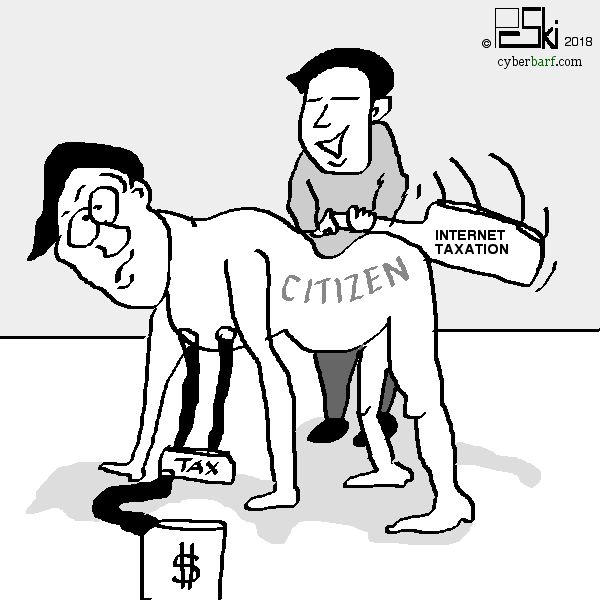|
cyberbarf VOLUME 17 NO. 12 EXAMINE THE NET WAY OF LIFE JULY, 2018 ©2018 Ski Words, Cartoons & Illustrations All Rights Reserved Worldwide Distributed by pindermedia.com, inc.
NEW EPISODE:
|
 |
|
|
|
Rock some site SUMMER WEAR. Check out our e-Store for current prices, sales and new items!
|
|
|
cyberbarf TAXATION WITHOUT REPRESENTATION INTERNET The U.S. Supreme did something very rash. It reserved decades of its own law under a fit of strained logic. In the end, the freedom of the internet will be eroded and the general public will find itself again at the mercy of tax collectors. In 1992, the Court had ruled in the Quill case that individual states could not tax Interstate Commerce. Only Congress had the authority to regulate Interstate Commerce, and it chose to let the Internet be open and free with exchange of services and goods. Case law goes back to the heady days of interstate catalog sales. Before malls, strip malls and shopping districts, many Americans bought items from catalog merchants like Sears, Montgomery Ward or Spiegel's (all based in Chicago, Illinois). If you were a rural farmer in Kansas and there was no department store in your county, you could order anything from Sears who would ship it via the US Mail to your doorstep. If Sears or any other merchant had no physical presence in your state, such as a store or shipping warehouse, then the merchant would not charge you a sales tax. Many states had imposed their own use taxes on their citizens for their out of state purchasers, under the guise that they would be equalizing the playing field for in-state merchants who had to collect the tax. The catalog precedents clearly held that the mere fact that an item is shipped across state lines does not give rise to a state being able to tax that item. Moving goods across state lines is the pure definition of Interstate Commerce. The Commerce clause was put into the Constitution to prevent States from becoming tariff hungry feudal operations. At the federal level, the freedom to do business across state lines was important for the well being of the national economy and beneficial to all citizens. But now with about half of the States being bankrupt, they are constantly looking for new ways to generate tax revenue. Internet sales taxation is the Golden Goose that states want to capture. A coalition of states believe that they are losing billions of tax dollars by their own citizens buying from out-of-state on-line merchants instead of their own local shops. Libertarians counter this argument by saying citizens are buying cheaper out-of-state goods because state sales taxes are too high. If States want to recapture lost sales tax revenue, they should lower their own taxes to make it more convenient to shop instate But States do not want to backtrack on any means of revenue creation. So they pressed their case through South Dakota v. Wayfair. The lower courts ruled against the States, relying upon the clear precedent of Quill that in order to tax a sale, a merchant needs a substantial nexus to the state, i.e. a physical presence. This was a simple and objective element based upon common sense. If you are a merchant physically in a state, that state is providing you services such as police, fire protection, transportation, etc. Since you are a business in the state you have to comply with all the state laws just like any other instate merchant. But the Supreme Court decided to throw out the simple, objective test to overrule Quill. It now believes that the act of selling merchandise in a state are sufficient contacts to create an obligation to collect sales tax. This is a potentially crippling blow to e-commerce, especially small businesses who use service platforms like Etsy to sell nationwide without a regulatory burden. And the dissenters find the potential burden horrible. There are more than 10,000 state and local tax agencies in the US The decision is not even clear if it applies only to state sales taxes or if local municipal taxes can be charged and collected as well. For example, a small craftsman who makes butterfly nets in Maine sells one to a teacher in South Dakota, the Maine seller is now obligated to collect and remit to South Dakota its sales tax. If the seller does not file the correct returns on time, the State of South Dakota could sue him in South Dakota for damages and penalties even though the Maine merchant has never been in South Dakota. If this was not a sales transaction, South Dakota or any of its citizens would not have any jurisdiction over the Maine merchant in South Dakota courts. This decision opens up conflicts with precedents on long arm jurisdiction and due process for out of state people. South Dakota convinced a majority of justices that its law was not as burdensome as respondents fear. It said that it was going after only merchants who sell $100,000 of goods or services or 200 transactions in the state. But those are vague mile posts. The Maine merchant who sells 200 butterfly nets for $10 each would be subject to the law - - - even though his gross sales are only $2,000. It makes it financially crippling for the Maine merchant to do business since the accounting, regulatory filing and alleged simple sales tax software is probably more than his gross Internet sales. It begs high taxed citizens to shop elsewhere to get more value for their hard earned dollar. For example, last year Cook County Illinois passed a soda tax under the guise of being a health bill. But it was a revenue added tax to fill a gaping budget hole. The soda tax included other non-fizzy drinks like orange juice. Merchants could not program their registers with the proper sales tax calculations. Some were sued by customers for collecting the tax in error. But many people got fed up with the new tax. They drove several miles outside Cook County to shop for their groceries. Government officials were stunned by the bad public relations and the real loss of sales tax dollars beyond the soda tax promised increases. Cook County quickly repealed the law in a rare win for the consumer-citizen. Consumers will get raked over the coals. There are five US states that do not have a state sales tax. Their merchants do not have the programs to calculate sales tax because it is unnecessary. But now, these tax free merchants will suddenly have to be unpaid, out-of-state tax collectors for 45 other states? When did that merchant sign up to be a serf for 45 new masters? Will a merchant in a tax-free state have to CARD every shopper in his store to determine if one of them is an out-of-state person? The case does not limit itself just to Internet sales. The act of selling to an out-of-state person (by any means) satisfies the nexus element. There is a faint hope that the decision will be reversed on other grounds. Left in the wake of the recent Supreme Court decision is the actual taxation test. It is a four part test in which the substantial nexus element is just the first element. The other parts of the test are 2) whether the state tax discriminates against out-of-state merchants; 3) whether the state tax is equally applied; and 4) whether the state provides services to the out-of-state merchants. It is the last element that free Internet proponents will have to use to keep Internet sales as they were before Wayfair. It is really a tangent off the nexus arguments. What services does a state provide an out-of-state Seller of interstate commerce goods? At first glance, nothing if the out-of-state Seller has no physical presence in the state. The act of shipping a package across state lines is not a service provided by a state (it is the post office carrier, UPS, or FedEx that is providing the services to both the Seller and purchaser). The states cannot say that they are allowing an out-of-state package to come through its borders because that would violate the commerce clause. It would create an anarchy of local customs and border checks that runs contrary to the meaning of interstate commerce. The states cannot say that the are providing access their citizens any right to shop and receive out-of-state goods because their citizens are not property of state government; citizens are not tax slaves (even though many politicians strongly believe citizens are tax cows to be milked for every penny). The Supreme Court took a clear, concise and easily enforceable law on interstate taxation and dragged it through the unknown murky gray mud of uncertainty. It may prompt Congress to act to repeal the decision on the physical nexus requirement, but the Trump administration actually sided with the States in this case. |
 |
FREELANCE CARTOONS, ILLUSTRATIONS FOR NEWSPAPERS, MAGAZINE, ON-LINE DO YOU CONTENT? CHECK OUT
|
|
iToons
cyberbarf PRIVACY IN THE HANDS OF STRANGERS COMMENTARY We have always said that storing your information in the cloud is like asking a seedy stranger in a dark alley to watch your data for you. The same is true in regard to your digital footprints. Your search history, your click through, your site selection, your social media likes, your friends, your pictures, your posts, your bank transactions, your shopping receipts - - - all of it is tracked and stored in computer files that you do not know where. All of your data is being compiled to be reformatted into Big Data. Big Data is the next big treading thing. Even journalists are trying to harness the information of Big Data to create stories about government programs to social issues. But who owns your personal data? Common sense would dictate that you own your own personal data. If so, then who controls your personal data? Under terms of service agreements and business records exceptions to privacy rules, probably someone else, someone you do not know, and someone who does not know you to protect your data from harm. It is the paradox of our generation. Are personal data is now more valuable than ever, but we have less and less control over it. Cookies are granted so you can have a full experience of a site. Search engines copy your search terms to force feed you screen with personalized ads. People may have subconsciously given up their sense of privacy on the Internet because it was free and open. But after more and more identity theft, people are trying to put the genie back into the bottle. The more computing power is given to marketing firms, the more each person's life is turned into salable data. No one really knows what large companies knows about you, your interests, your job, your finances, your taxes, your loves or your hates. Even if you try to re-set your privacy settings on social media, your ISP clicks are still being recorded somewhere. It is a business record that a government agency can gather, with or without a warrant. Unless you want to become an off-the-grid survivalist, you have to limit your breach of privacy exposure. You can stop using the cloud for storage of personal information. You can always check the box to have your credit card information NOT being kept on your computer key chains. You can try to purge your search histories on your portable devices. You could use cash instead of debit card swipes. Stop sharing your drunken pictures on instagram. You can hide under your bed sheets in the fetal position. You will only know when your privacy has been compromised when it is too late. It may be an awkward picture found by your family. Or an extremely non-PC post found by your employer. You open up your credit card statement to find that you card has purchased $20,000 in out-of-state car parts. You file your federal tax return for a refund but to find months later that someone else forged a return and stole your refund. There is very little recourse for net privacy violations. Most police departments do not deal with cybercrimes unless it is massive breaches. Social media platforms will take down offending content but that is only after serious concerns are raised to the platform. Trying to undo identity fraud could take several frustrating years to correct. The Internet has led to people losing their inhibitions. They will say and do things on-line which they would never do face to face to another person. As people lose their personal space barriers, they forgot about the value of their own privacy. In one aspect, an Internet addict has turned himself into a public figure - - - who has less expectations of privacy in their personal life. It is a cruel human cycle of wanting to be heard on-line while opening your secrets for public view.
|
|
|
 |
 |
|
cyberbarf THE WHETHER REPORT |
cyberbarf STATUS |
| Question: Whether the EU's proposed new copyright laws will stifle Internet platforms into blocking Europe? |
* Educated Guess * Possible * Probable * Beyond a Reasonable Doubt * Doubtful * Vapor Dream |
|
Question: Whether the current policy backflips, lack of leadership, Congressional deadlock eventually hurt the US economy more than a Tariff War with China ? |
* Educated Guess * Possible * Probable * Beyond a Reasonable Doubt * Doubtful * Vapor Dream |
| Question: Whether telephone companies wanting to kill off landline phones a good move for consumers? |
* Educated Guess * Possible * Probable * Beyond a Reasonable Doubt * Doubtful * Vapor Dream |
|
LADIES' JAMS MULTIPLE STYLES-COLORS $31.99 PRICES TO SUBJECT TO CHANGE PLEASE REVIEW E-STORE SITE FOR CURRENT SALES
|
PRICES SUBJECT TO CHANGE; PLEASE CHECK STORE THANK YOU FOR YOUR SUPPORT!
NEW REAL NEWS KOMIX! SHOW HACK! |
 |
cyberbarf
Distribution ©2001-2018 SKI/pindermedia.com, inc.
All Ski graphics, designs, cartoons and images copyrighted.
All Rights Reserved Worldwide.











